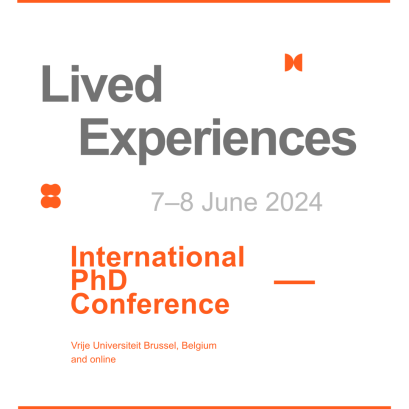Vrije Universiteit Brussel, Belgium
7 June 2024 in person, 8 June 2024 online
CLIC is pleased to announce that the international two-day PhD conference are now open! Click here to register.
Spaces are limited, so registrations will work on a first-come, first-served basis. Registrations will close after 3 June.
Practical Information
The conference takes place in Brussels, Belgium, on June 7th, and online on June 8th, 2024, and will take place in English.
The conference aims to create a platform for doctoral students specializing in literary studies, literary translation studies, and theatre studies to showcase their research and engage in discussions on the profound impact of personal narratives and lived experiences in shaping creative works. It provides an excellent opportunity for emerging scholars to actively participate in scholarly dialogues, share their findings, and contribute to the broader academic discourse.
On the first day, professor Anneleen Spiessens (UGent) is giving a talk on Stories of Violence Across Time, Space and Genre: How Translation and Translators Shape (Trans)Cultural Memory. Our second keynote speaker is our former Lorand Chair in Intermediality Studies (22-23), Nassim Balestrini (University of Graz) with a talk on Contemporary Poetry as Relational Life Writing and Historiographic Intervention.
The full programme can be found on the conference website.
Theme and Scope

The theme of this year's PhD conference is 'Lived Experiences'. Numerous scholars have explored how the book as a medium shapes the ways in which authors practice life writing. In “Putting Lives on the Record: The Book as Material and Symbol in Life Writing” (2017), Anna Poletti proposes an innovative approach to biography studies focusing on that centrality of “the book as both a medium and a symbol” to both “the practice and the scholarship of life writing” (Poletti, 460). However, a reading strategy, which emphasizes the relationship between a life writing practice and its medium/form, can be applied not only to book-based practices, but also to writing grounded in lived experience across various media, media combinations, and culturally defined forms of writing.
Recently, life writing studies took an intermedial and transcultural turn (Rippl, 147), marked by publications such as the volume Intermediality, Life Writing, and American Studies: Interdisciplinary Perspectives, edited by Nassim Winnie Balestrini and Ina Bergmann (2018), Experiments in Life-writing: Intersections of Auto/biography and Fiction, edited by Lucia Boldrini and Julia Novak (2017), and Anna Poletti’s (2020) monograph Stories of the self: Life writing after the book. Even more recently, Claudia Jünke and Désirée Schyns published Translating Memories of Violent Pasts: Memory Studies and Translation Studies in Dialogue (2023), a collection of essays from memory studies and translation studies investigating the exploration of memories of violence through the practices of interlingual and intercultural literary translation. As Jünke and Schyns highlight in their introduction to the last-mentioned work, cultural translation already implies a form of remembering: the target text always retains its dual context. It connects the past of the source to practices of rewriting and dynamics of cultural transmission in the present.
Lived Experiences seeks to further our understanding of the ways different (combinations of) media, genres, and writing practices (e.g., literary translation) can allow for different expressions and explorations of personal experience. It aims to focus on lived experiences as a catalyst for (literary) creativity, with texts using the conventions and the material, modal, formal, and symbolic affordances of media, genres, and writing practices in creative ways to express specific forms of lived experiences (such as traumatic, formative, or shared cultural experiences). By bringing together scholars of life writing and other literary practices in which lived experience plays a central role, it invites participants to reflect both on how media and genres shape creative forms of life writing and how the need or desire to represent, analyze, or simulate lived experiences can inform practices of literary creation.
REFERENCES
Balestrini, Nassim Winnie, and Ina Bergmann, editors. Intermediality, life writing, and American studies: Interdisciplinary perspectives, Walter de Gruyter GmbH & Co KG, 2018.
Boldrini, Lucia, and Julia Novak, editors. Experiments in Life-writing: Intersections of Auto/biography and Fiction. Springer, 2017.
Jünke, Claudia and Désirée Schyns, editors. Translating Memories of Violent Pasts, Routledge, 2023.
Poletti, Anna. “Putting Lives on the Record: The Book as Material and Symbol in Life Writing”. Biography, vol. 40, no. 3, 2017, pp. 460–484.
Poletti, Anna. Stories of the self: Life writing after the book. NYU Press, 2020.
Rippl, Gabriele. “Ekphrastic Encounters and Word-Photography Configurations in Contemporary Transcultural American Life Writing”. Intermediality, life writing, and American studies: Interdisciplinary perspectives, 2018, pp. 147–166.
